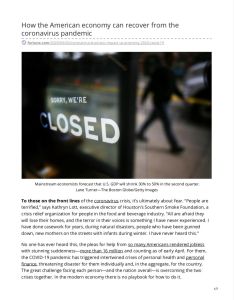Join getAbstract to access the summary!

Join getAbstract to access the summary!
Geoff Colvin
How the American Economy Can Recover from the Coronavirus Pandemic
Fortune, 2020
What's inside?
One of the worst economic downturns in history risks altering the American economy for decades.
Recommendation
In this sobering assessment of economic recovery from the COVID-19 pandemic, columnist Geoff Colvin spells out the damage done to US consumers, who contribute the major share of the country’s GDP. He describes how the double punch of disease and unemployment has already changed the behavior of individuals and businesses. Colvin argues that an environment of socioeconomic trauma requires creative and sound leadership from policy makers and executives who can offer realistic expectations and decisive actions.
Take-Aways
- The coronavirus has caused unmatched levels of fear in the consumer-driven American economy.
- Massive amounts of government assistance are crucial to the recovery, but people will bear the scars of this experience for years to come.
- Decisive leadership is essential to manage the present crisis and to plan for the next.
Summary
The coronavirus has caused unmatched levels of fear in the consumer-driven American economy.
The US economy depends on consumers: Their collective activity accounted for 68% of GDP at the end of 2019. But by mid-April 2020, job losses – unprecedented in number and speed – had ravaged people’s finances, while a new contagious disease threatened their health. The result was widespread fear.
““No one has ever heard this, the pleas for help from so many Americans rendered jobless with stunning suddenness.” ”
A “doom loop” was ensnaring workers and employers: Individuals were unable to spend due to the social isolation and business closures mandated to control the spread of the disease, and so companies had to shed personnel, wreaking more financial havoc for citizens.
Massive amounts of government assistance are crucial to the recovery, but people will bear the scars of this experience for years to come.
The federal government passed the CARES (Coronavirus Aid, Relief and Economic Security) Act to put needed cash into people’s pockets and to subsidize enhanced unemployment benefits. One of the act’s features, the Paycheck Protection Program, offered forgivable loans to cover 20 weeks of payroll and location expenses to small businesses of up to 500 employees, the type of firm that employs more than half of America’s workers.
““In theory, [CARES] is a sensible policy response, helping to break the doom loop by giving businesses and workers certainty.””
The CARES Act has helped, yet it cannot eliminate the trepidation people are feeling. Individuals, uncertain about their future, are as circumspect about spending as employers are about hiring. The risk of near-term economic decline will cause people to spend primarily on necessities. Over the longer run, the pandemic experience will lead consumers to shop and invest differently, probably by spending less and saving more. Young people will feel the slowdown’s effects more acutely than their elders. Current high school and college students will likely earn less throughout their careers – recession graduates, according to some research, make less money into midlife than other groups and tend to suffer adverse health consequences. For businesses, working from home will become more common. Capital investment could be meager, and supply chains will spread out even more to avoid concentration risks.
Decisive leadership is essential to manage the present crisis and to plan for the next.
The world must prepare for the next catastrophe, whatever form it takes. Businesses need to be ready for disruptions such as major earthquakes, nuclear incidents, electrical infrastructure collapses and other pandemics.
““This crucible experience will be career-defining for many leaders. In any crisis — especially a historic global catastrophe in which the main factor is uncertainty — people want leaders to give them information, reassurance and a plan.””
Executives will need to draw on their creativity and zeal to manage in these unpredictable times. Resolute leadership, transparency and a balanced perspective that conveys hope are required now and in the future.
About the Author
Geoffrey Colvin is an author and a columnist at Fortune magazine.
This document is restricted to personal use only.





















Comment on this summary